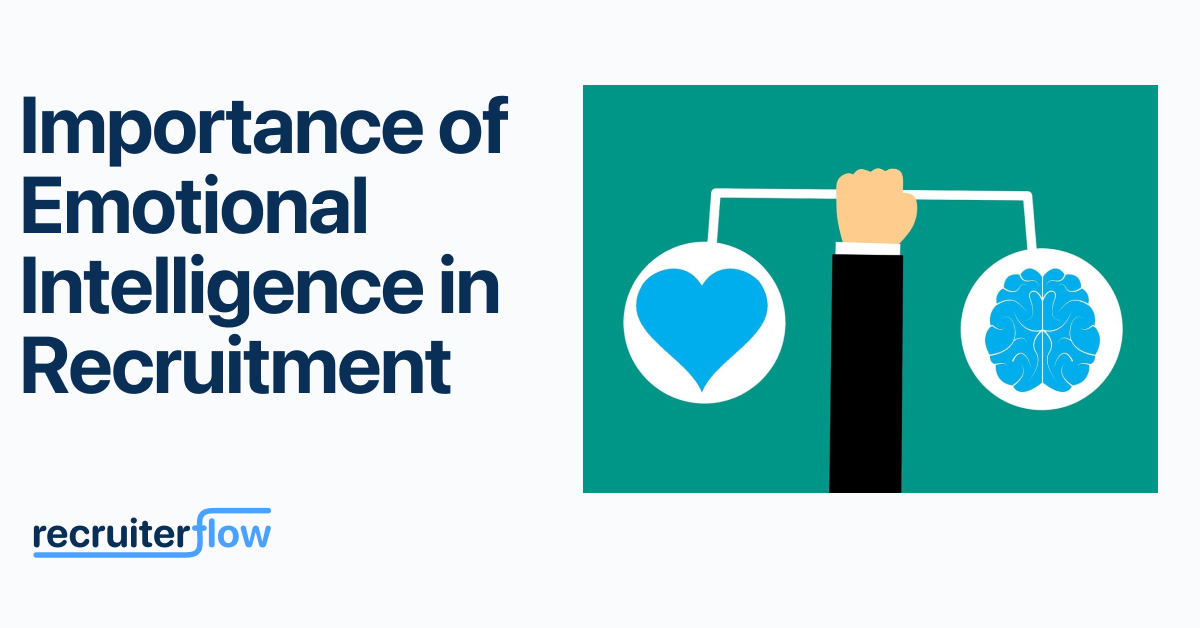
Importance of Emotional Intelligence in Recruitment

In the rapidly changing and high-pressure recruitment world, Emotional Intelligence (EI) has emerged as a vital asset for recruiters to possess.
Recruitment involves continuous interaction with individuals, including candidates and potential clients for recruiters at agencies. This involves daily negotiations and navigating diverse emotional states. Therefore, the capacity to interpret the responses of those you’re engaging with, and adeptly manage these interactions, alongside regulating your own emotions, holds paramount significance within the domain of recruiting.
EI, defined as the capacity to understand, manage, and utilize emotions in oneself and others, has transitioned from being a desirable attribute to an essential requirement.
This shift in perspective has brought about a significant transformation in the recruitment landscape, moving away from the traditional ‘question and answer’ style that used to dominate toward a more engaging, interactive, and productive approach. This shift towards EI encourages meaningful conversations, empathy, and authenticity.
It equips recruiters with the tools to navigate the complex emotional terrain of the hiring process. Emotional Intelligence enables recruiters to establish deeper connections with candidates, moving beyond simply evaluating skills and qualifications to identifying individuals who resonate with the company’s culture and values.
In this article, we delve into the pivotal role of Emotional Intelligence in recruitment and explore how recruiters can leverage it to forge connections with candidates, cultivate strong relationships, and ultimately identify the best-fit candidate for the job.
Why recruiters should possess high Emotional Intelligence
Recruiters play a pivotal role in connecting candidates with suitable job opportunities while managing relationships with clients and candidates. Given the nature of their work, possessing high emotional intelligence (EI) is paramount for success in the field. EI, which encompasses self-awareness, self-regulation, empathy, and effective interpersonal skills, is beneficial in personal life and proves indispensable in the world of recruitment. Here’s why recruiters should possess high emotional intelligence:
1. Building Rapport and Effective Communication
Recruiting is all about relationships and effective communication. A recruiter with high EI can establish rapport quickly, understand the motivations and needs of candidates, and communicate in a way that resonates with them. This leads to better engagement, improved candidate experience, and increased trust.
2. Tailoring Approaches to Individuals
Successful recruitment hinges on understanding candidates’ values, preferences, and aspirations. Recruiters with high EI can adapt their strategies to align with each candidate’s unique attributes. This personalized approach enhances the chances of finding the right fit for both the candidate and the company.
Also Read: 10 soft skills succesful recruiters have in common
3. Managing Stress and Setbacks
The recruitment process can be demanding and unpredictable. High EI equips recruiters with the ability to manage stress, bounce back from setbacks, and maintain a positive outlook. This resilience contributes to maintaining motivation and productivity even when faced with challenges.
4. Ethical Decision-Making
An essential aspect of EI is ethical awareness and decision-making. Recruiters often face situations where they must balance the interests of clients, candidates, and the company. With a solid moral foundation, recruiters can make choices that uphold integrity and fairness for all parties involved.
5. Empathy and Conflict Resolution
Empathy is a cornerstone of EI and is crucial in understanding candidates’ and clients’ perspectives. Recruiters with high EI can navigate conflicts, address concerns, and negotiate effectively, fostering harmonious relationships and optimal outcomes.
6. Self-Development and Growth
Recruiters need to evolve and refine their skills continuously. High EI facilitates introspection, enabling recruiters to recognize their strengths and weaknesses. This self-awareness supports ongoing self-development and the pursuit of professional growth.
7. Adapting to Changing Scenarios
The recruitment landscape is dynamic, with recruitment trends and requirements evolving constantly. Recruiters with high EI are adaptable and open to change. They can swiftly adjust their strategies and approaches to meet new challenges and capitalize on emerging opportunities.
8. Balancing Personal and Professional Boundaries
High EI empowers recruiters to set healthy boundaries in their interactions with candidates and clients. Saying “no” when necessary and avoiding overly stressful engagements enhances overall well-being and job satisfaction.
9. Enhanced Team Dynamics
EI doesn’t just impact individual performance; it also influences team dynamics. Recruiters with high EI contribute positively to team cohesion, communication, and enterprise collaboration, creating a supportive work environment.
Also Read: How to be a successful recruiter?
How recruiters can use emotional intelligence to foster great relationships with candidates
The Evolution of Traditional Behavioral Interviews
Over the years, recruiters have heavily relied on behavioural interviews based on the notion that past behaviour can predict future performance. These interviews have provided valuable insights into a candidate’s problem-solving abilities, teamwork skills, adaptability, and conflict-resolution prowess. However, in the era of digital advancements and artificial intelligence, the efficacy of this conventional approach is now under scrutiny.
Modern candidates come prepared with rehearsed answers to common behavioural questions. They scour the internet for guidance or receive mentor coaching, tailoring responses to match the desired candidate profile. Despite their technical polish, these answers often lack the authenticity that allows recruiters to gauge a candidate’s genuine capabilities and potential.
Thus, the question arises: is it time for recruiters to reevaluate the role of behavioural interviews in their recruitment strategy? Could a more holistic, nuanced interviewing technique unveil the authentic, high-potential candidates they are seeking?
The Significance of Conversational Interviews
According to experts, there are transformative benefits of shifting from a rigid, question-driven interview format to a more open, relaxed, conversational approach. Initiating broader topics and allowing candidates to direct the dialogue yields favourable results.
This organic conversational flow allows candidates to share their experiences, skills, and attitudes without the pressure of being in an examination setting. For example, discussing a candidate’s project management background could naturally evolve into a deeper exploration of their problem-solving aptitude, leadership philosophy, or stress-handling strategies.
Conversational interviews can uncover a more authentic and comprehensive view of a candidate’s potential—a dimension that traditional behavioural questions often fail to capture. This shift in interviewing methodology has revolutionized the recruitment process.
Leveraging Emotional Intelligence to Address Misunderstandings
Misunderstandings during interviews are inevitable. The key lies in addressing them with Emotional Intelligence—refraining from hasty conclusions and instead striving to comprehend the candidate’s perspective better. Phrases like “I may have misunderstood; could you help me grasp this better?” allow candidates to clarify or expand on their responses.
This approach conveys that their viewpoints are valued and appreciated, transforming the interview from an evaluative talent assessment to an interactive discussion. This empathetic approach fosters an environment of openness and honesty, enabling candidates to express themselves freely. This, in turn, leads to more productive conversations and better-informed hiring decisions.
Harnessing Emotional Intelligence to Foster Authentic Connections
When candidates are at ease, their genuine personalities shine through. They feel less scrutinized and valued, enabling a more sincere and insightful exchange. This approach brings a human element to recruitment, a facet often overshadowed in formal interview settings—the dynamics of an interview shift when candidates are comfortable enough to be themselves. Recruiters can perceive candidates as individuals, not just potential hires.
This perspective uncovers unique strengths, innovative problem-solving capabilities, and exceptional interpersonal skills that might remain concealed in a conventional interview. This authenticity elevates the interview process and leads to more precise hiring decisions, culminating in a more engaged and contented workforce.
It’s a mutually advantageous scenario: candidates feel acknowledged, and clients gain motivated and dedicated employees.
Conclusion
Emotional Intelligence is not a fleeting trend but the cornerstone of effective recruitment in today’s competitive job market. By valuing genuine responses over-rehearsed ones and fostering authentic relationships with candidates, recruiters are better positioned to make well-rounded hiring choices.
As the recruitment landscape continues to evolve, tapping into the power of EI is crucial for establishing meaningful, enduring human connections. After all, recruitment isn’t merely about filling positions—it’s about investing in people and their potential.




Sagrika Jain